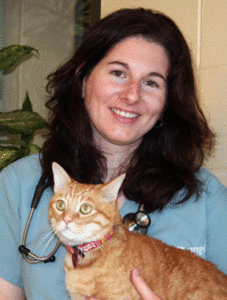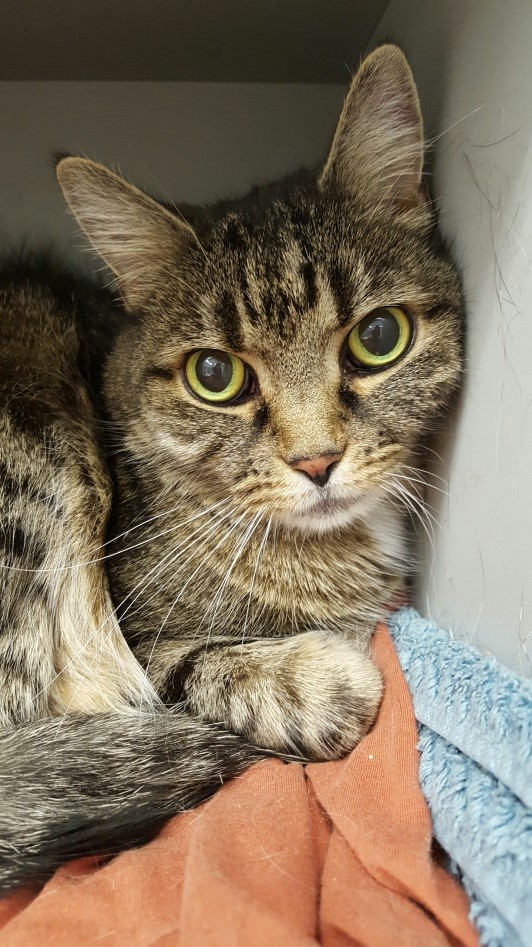-
Adopt
-
Veterinary Care
Services
Client Information
- What to Expect – Angell Boston
- Client Rights and Responsibilities
- Payments / Financial Assistance
- Pharmacy
- Client Policies
- Our Doctors
- Grief Support / Counseling
- Directions and Parking
- Helpful “How-to” Pet Care
Online Payments
Referrals
- Referral Forms/Contact
- Direct Connect
- Referring Veterinarian Portal
- Clinical Articles
- Partners in Care Newsletter
CE, Internships & Alumni Info
CE Seminar Schedule
Emergency: Boston
Emergency: Waltham
Poison Control Hotline
-
Programs & Resources
- Careers
-
Donate Now

Angell General Medicine Service
Angell.org/generalmedicine
617-522-7282
Hyperthyroidism is a fairly common condition in middle-aged and older cats, and it is usually due to a benign growth (adenoma) on the thyroid gland in the neck. The growth causes the overproduction of thyroid hormone which can lead to weight loss despite increased appetite, excessive drinking and urination, and changes in behavior. It also can cause muscle deterioration, heart disease, vomiting, diarrhea, and high blood pressure. The diagnosis of hyperthyroidism is usually made when a blood test reveals a high level of thyroid hormone (T4) circulating in the body. Often the veterinarian can also palpate a growth on the cat’s thyroid gland. Diagnosis can occasionally be difficult, though, as many illnesses can decrease the level of T4 in the body. Also, since T4 levels normally fluctuate, even a hyperthyroid cat may have a T4 in the normal range for part of the day. In these cases, additional testing may be necessary to confirm the diagnosis.
There are several treatment options available for hyperthyroidism, but the first line of treatment is often a medication called methimazole. Methimazole interferes with the body’s production of thyroid hormone. It is usually well tolerated but may initially cause some stomach upset. More severe side effects are uncommon but can include liver problems, decreased blood cell production by the bone marrow, facial scratching, and the “unmasking of kidney disease.” The term “unmasking” refers to the fact that the medication isn’t directly harming the kidneys, but since the hyperthyroid state is actually beneficial to kidney function, underlying kidney disease may be revealed when treatment is initiated. About 10 days after starting medication, the patient’s blood work is rechecked. The blood test results will allow the veterinarian to determine if the cat is on a correct dose of medication and if his/her organs are tolerating it well. Several subsequent rechecks may be necessary, but monitoring becomes less frequent once the thyroid condition is well-controlled.
Another treatment option for hyperthyroidism is radioactive iodine therapy, also known as I-131. Radioactive iodine treatment is usually a permanent solution, and it involves hospitalization for an injection of radioactive material that will destroy the overactive thyroid tissue. Even if radioactive iodine treatment is the ultimate goal, treatment with methimazole is usually initiated first to make sure the cat’s kidneys can function well enough without excess thyroid hormone. I-131 is also a very effective treatment for the small percentage of cats suffering from hyperthyroidism caused by a cancerous thyroid growth (thyroid carcinoma). There is some concern that benign adenomas can become cancerous carcinomas over time, even if being treated with methimazole. Since I-131 treatment destroys the abnormal tissue, it prevents conversion to cancer. For more information on radioactive iodine treatment, please visit angell.org/i131.
Surgical removal of the abnormal thyroid gland is a less common treatment option, but it may be recommended for cats experiencing mechanical problems due to the presence of a large, cystic thyroid mass in the neck. Surgery is also an option for removal of cancerous thyroid masses. It is a delicate procedure but tends to have a good success rate.
Since iodine is required for the production of thyroid hormone, a diet very low in iodine (such as Hill’s Prescription Diet y/d) can help reduce circulating T4 levels. While there are still some unanswered questions about treating hyperthyroidism with diet, it may be a good option for cats that are difficult to medicate and unable to receive radioactive iodine therapy due to cost, other health concerns, etc. When treating with a diet such as y/d it is very important that the cat not eat any other food, including treats and table scraps, as ingestion of any iodine will interfere with the efficacy of the diet.
Since first being reported in the late 1970s, the incidence of hyperthyroidism in cats has increased significantly. The cause still remains unknown, but it is likely that the disease results from a combination of several different factors. The good news is that hyperthyroidism is relatively easy to diagnose and manage in most cats, and effective treatment results in good quality of life.
For information about Angell’s General Medicine service, please visit www.angell.org/generalmedicine or call 617-522-7282.
